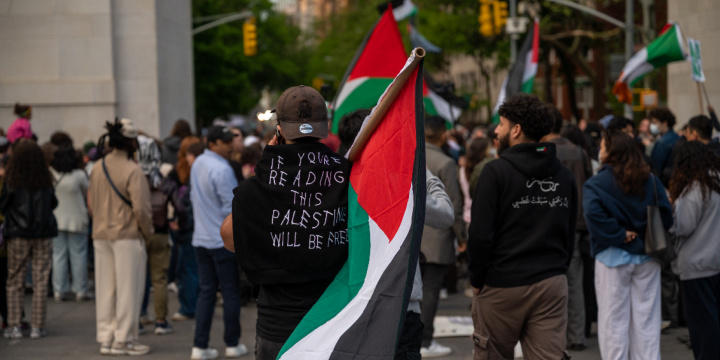Illustrative: Pro-Hamas activists gather in Washington Square Park for a rally following a protest march held in response to an NYPD sweep of an anti-Israel encampment at New York University in Manhattan, May 3, 2024. Photo: Matthew Rodier/Sipa USA via Reuters Connect
The Foundation for Individual Rights and Expression (FIRE) on Monday implored West Virginia University (WVU) to lift a no-contact order imposed on a Jewish pro-Israel student following a bizarre series of events in which he was reported for promoting pro-Israel speech on campus, The Algemeiner has learned.
According to a letter sent by the nonprofit organization, WVU freshmen Eliyahu Itkowitz was distributing copies of attorney Alan Dershowitz’s book The Ten Big Anti-Israel Lies: And How to Refute Them With Truth during the final weeks of fall semester when he was approached by dining hall employee Hannah Harper — who, as uncovered by an Algemeiner investigation, is a white female who recently converted to Islam. Itkowitz offered Harper a copy of the book. She accepted it.
However, Harper, who had been made aware of Itkowitz’s Jewish identity and support for Zionism through her dealings with the campus’ Muslim Students Association (MSA), apparently had ulterior motives for accepting the book. Following the interaction, she delivered the copy of Dershowitz’s book to the university’s Division of Diversity, Equity, and Inclusion (DDEI) and with it a complaint alleging that the student had handed her an “anti-Muslim book” as a discriminatory act. Itkowitz has denied that he meant Harper any harm.
Harper continued her pursuit of Itkowitz weeks later in the main dining hall after he had returned to school for spring term. Having caught sight of him, she falsely told her manager, Brad Dobson, that the student had been banned from eating there due to the complaint she had filed. The unsuspecting manager accosted the student and demanded that he take lunch somewhere else. Itkowitz refused, choosing instead to record the incident with this smartphone while Harper escalated the situation by calling the police.
“The university launched an investigation, despite the fact that even if all of her allegations against Eli were true, and there is evidence to suggest that they aren’t, all of the described actions constitute protected speech under the First Amendment,” Jessie Appleby, FIRE program counsel for campus advocacy, told The Algemeiner on Monday during an interview. She added that school officials ultimately determined that Harper’s allegations did not merit punishing Itkowitz. However, they did so after an invasive investigation and handing down a no-contact directive, which carries inculpatory implications, ordering Itkowitz to avoid all contact with Harper
The measure should be lifted, Appleby said.
“Because the investigation itself threatened discipline, it chilled free speech. It lasted five months, exhaustive interviews, and the no-contact order even though it never found him guilty of misconduct. Eli should not feel threatened that exercising free speech will incur disciplinary sanctions,” she continued. “One issue with schools investigating complaints investigating protected speech is that it allows students to use the complaint process to cudgel those with whom they disagree into silence, and we’ve seen a lot of that at West Virginia University.”
The case of Itkowitz is not the first time FIRE discovered that a university allegedly incriminated pro-Israel students for expressing their support for Zionism.
In 2023, it partnered with the Anti-Defamation League (ADL) to publicize a Princeton University incident in which Alexandra Orbuch, a writer for conservative publication The Princeton Tory, was assaulted by a male member of Students for Justice in Palestine (SJP) while filming a protest the group held on campus. The man allegedly followed Orbuch to obstruct her efforts, eventually stepping on her foot and pushing her. When Orbuch complained to a nearby public safety officer, the officer told her that she, not her attacker, had “incited something.”
Despite the gendered nature of the assault — an issue Princeton has dedicated an entire office to dealing with — the university granted the male student a no-contact order against Orbuch, explaining that any reporting she published which alluded to him would be considered a violation of the order and result in disciplinary charges. A similar incident occurred in 2022, when Tory reporter Danielle Shapiro attempted to report on the Princeton Committee on Palestine. After being notified of the order, Shapiro was told refer to a “Sexual Misconduct & Title IX” webpage, according to a guest column she wrote in the Wall Street Journal.
Princeton University later banned the practice of placing no-contact orders on conservative and pro-Israel students. In Monday’s letter, FIRE called on West Virginia University to do the same.
“WVU has a responsibility to prevent discriminatory harassment, but in doing so it must not sacrifice its constitutional obligation to protect free speech,” the group said. “An investigation and no-contact order based on protected expression is likely to chill student speech — even when, like here, the process ultimately concludes in favor of the speaker — because such a process implicitly threatens punishment for that speech.”
The Algemeiner has reached out to WVU for comment.
Follow Dion J. Pierre @DionJPierre.
The post Jewish West Virginia Student Targeted by Dining Hall Employee Over Pro-Israel Views first appeared on Algemeiner.com.
Click this link for the original source of this article.
Author: Dion J. Pierre
This content is courtesy of, and owned and copyrighted by, https://www.algemeiner.com and its author. This content is made available by use of the public RSS feed offered by the host site and is used for educational purposes only. If you are the author or represent the host site and would like this content removed now and in the future, please contact USSANews.com using the email address in the Contact page found in the website menu.








